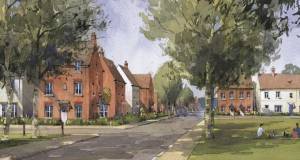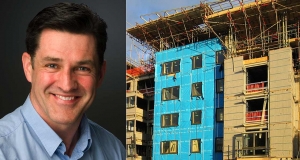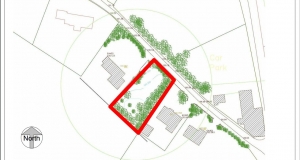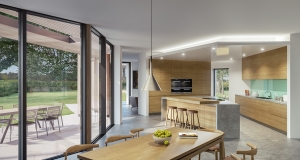- Planning
- Posted
Green light for major Enniscrone development
PLANS
for a major housing development in the West Sligo seaside resort of
Enniscrone, which attracted some intense local opposition and critical
observations from a number of public bodies, have been approved by the
board members of An Bord Pleanala.
PLANS
for a major housing development in the West Sligo seaside resort of
Enniscrone, which attracted some intense local opposition and critical
observations from a number of public bodies, have been approved by the
board members of An Bord Pleanala.
Permission for the development of 200 housing units, three retail units and a creche at Carrowhubbock South, off the Enniscrone-Easkey road and eight miles from Ballina had been applied for by the Hannon family and approved by Sligo County Council.
This decision was appealed to An Bord Pleanala by Brendan and Deirdre Quinn and others. The planning board’s inspector, Emer Doyle recommended refusal but she was directed by the Bord members to draw up “rea-ons, considerations and conditions” for a grant of permission with conditions.
The site in question is of 9.51 hectares and is currently being used for agricultural purposes. It is divided into a number of fields by stone walls. There are a number of recorded monuments in the vicinity of the site. Observations on the planning application/appeal were made to An Bord Pleanala by Jerry and Carmel Reynolds, Failte Ireland, The Heritage Council, An Taisce and the North Western Regional Fisheries Board.
The objectors said the proposed development was premature and unsustainable in terms of the town’s short to medium term housing need. The said the houses would be too close to existing houses on the eastern boundary and the style of houses and three storey apartments would be out of line with existing house styles in the area.
They said the development would create traffic problems, would affect archaeological sites and monuments. It would have a negative affect on water supply and sewage treatment. Enniscrone was awash with empty houses and did not need this development.
They also said the Bord must take the views of local people, and the level of local opposition, into account and pointed out that 39 written submissions were received including one signed by 213 people.
The Bord’s inspector considered the development would result in an over supply of houses in the area and would result in empty houses. She was of he view the development was unsustainable and would result in undesirable commuting patterns having regard to the poor employment opportunities and limited levels of public transport in the area. She was of the view a housing estate of the size and scale proposed would damage the tourist industry in Enniscrone.
She noted that the applicants proposed measures to increase the water supply and pressure and that a new sewerage treatment plant was expected by the second quarter of 2008.
The Board of An Bord Pleanala granted permission, saying that in deciding not to accept the inspector’s recommendation to refuse permission, the board had regard to the zoning of the site, the designation of Enniscrone as a key support town in the Sligo County Council development plan, the proposed use of the houses for permanent residential occupation, the upgrading of the sewage treatment plant, and considered that, subject to conditions, including phasing, the proposed development would be an acceptable form of development at this location.
(c) Western People
Permission for the development of 200 housing units, three retail units and a creche at Carrowhubbock South, off the Enniscrone-Easkey road and eight miles from Ballina had been applied for by the Hannon family and approved by Sligo County Council.
This decision was appealed to An Bord Pleanala by Brendan and Deirdre Quinn and others. The planning board’s inspector, Emer Doyle recommended refusal but she was directed by the Bord members to draw up “rea-ons, considerations and conditions” for a grant of permission with conditions.
The site in question is of 9.51 hectares and is currently being used for agricultural purposes. It is divided into a number of fields by stone walls. There are a number of recorded monuments in the vicinity of the site. Observations on the planning application/appeal were made to An Bord Pleanala by Jerry and Carmel Reynolds, Failte Ireland, The Heritage Council, An Taisce and the North Western Regional Fisheries Board.
The objectors said the proposed development was premature and unsustainable in terms of the town’s short to medium term housing need. The said the houses would be too close to existing houses on the eastern boundary and the style of houses and three storey apartments would be out of line with existing house styles in the area.
They said the development would create traffic problems, would affect archaeological sites and monuments. It would have a negative affect on water supply and sewage treatment. Enniscrone was awash with empty houses and did not need this development.
They also said the Bord must take the views of local people, and the level of local opposition, into account and pointed out that 39 written submissions were received including one signed by 213 people.
The Bord’s inspector considered the development would result in an over supply of houses in the area and would result in empty houses. She was of he view the development was unsustainable and would result in undesirable commuting patterns having regard to the poor employment opportunities and limited levels of public transport in the area. She was of the view a housing estate of the size and scale proposed would damage the tourist industry in Enniscrone.
She noted that the applicants proposed measures to increase the water supply and pressure and that a new sewerage treatment plant was expected by the second quarter of 2008.
The Board of An Bord Pleanala granted permission, saying that in deciding not to accept the inspector’s recommendation to refuse permission, the board had regard to the zoning of the site, the designation of Enniscrone as a key support town in the Sligo County Council development plan, the proposed use of the houses for permanent residential occupation, the upgrading of the sewage treatment plant, and considered that, subject to conditions, including phasing, the proposed development would be an acceptable form of development at this location.
(c) Western People
Related items
-
 Saint Gobain launches online technical academy
Saint Gobain launches online technical academy -
 More UK councils adopt passive house standard
More UK councils adopt passive house standard -
 Our passive journey #4: Planning, storm water decisions & heating with tea lights
Our passive journey #4: Planning, storm water decisions & heating with tea lights -
 How to make Irish housing genuinely affordable...
How to make Irish housing genuinely affordable... -
 Our passive journey #3: Designing our family’s passive house
Our passive journey #3: Designing our family’s passive house -
 Planning granted for new passive house in listed parkland
Planning granted for new passive house in listed parkland

